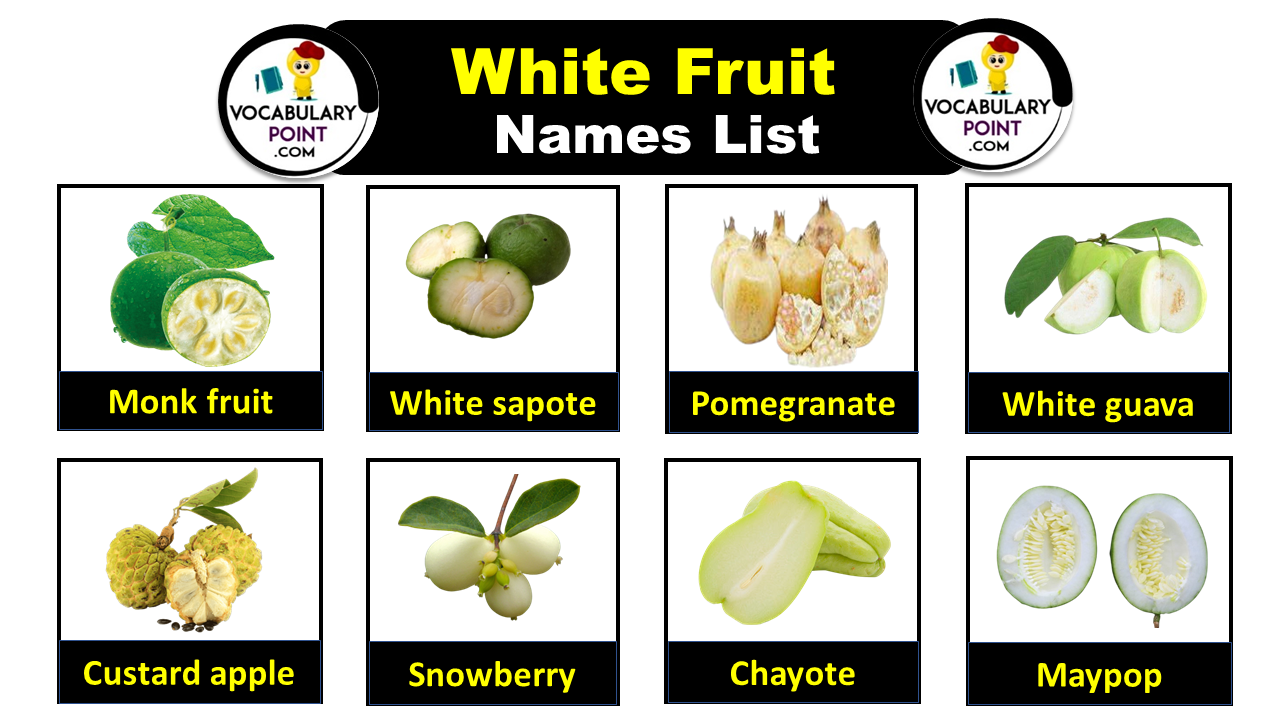White fruit may not be the most vibrant in color, but they certainly possess a unique charm of their own. From luscious apples to succulent pears and exotic dragon fruits, the world of white fruit is diverse, fascinating, and often overlooked.
Whether you are a culinary enthusiast looking for new ingredients to experiment with or simply intrigued by the beauty and taste of these pale-hued delights, this article will take you on a journey through a comprehensive white fruit name list that will leave your taste buds tingling and your mind buzzing with endless possibilities. So sit back, grab a pen and paper, and get ready to explore the captivating world of white fruits.
White Fruit Names
Monk Fruit
A small, round fruit used as a natural sweetener, known for its intense sweetness with zero calories.
Tamarind
A pod-like fruit with a tangy pulp used in cuisines worldwide for its sour flavor in dishes and candies.
White Pomegranate
A variant of pomegranate with sweet, less tart arils, and a pale interior compared to the red variety.
White Blackberry
A less common variety of blackberry, with sweet, white or pale yellow fruit when ripe.
Honeydew
A sweet melon with a smooth, pale green skin and light green flesh, known for its high water content.
Buddha’s Hand
A citrus fruit with a unique shape of finger-like sections, used primarily for its zest and aromatic qualities.
Plantain
A starchy banana variety, cooked before eating, used in many tropical cuisines as a staple food.
White Grape
A variety of grape with a green to golden skin, used in wine making and eaten fresh.
Nectarine
A smooth-skinned fruit similar to a peach, with a firmer, sweeter flesh.
Rambutan
A tropical fruit with hairy red and green skin, covering sweet, translucent flesh around a seed.
Plum
A juicy fruit with a variety of colors and flavors, ranging from sweet to tart, used fresh and in cooking.
Quince
A hard, yellow fruit when mature, used cooked to make jams, jellies, and quince paste.
Pineapple
A tropical fruit with a rough, spiky exterior and sweet, juicy, yellow flesh inside.
Osage Orange
A large, green, brain-like fruit, not commonly eaten, often used as a natural insect repellent.
Blueberry
A small, blue-purple berry, sweet and nutritious, often eaten fresh or used in baking and preserves.
Breadfruit
A large, tropical fruit, starchy and used as a vegetable in many cuisines, eaten cooked.
Cranberry
A tart, red berry, used in juices, sauces, and baking, known for being associated with Thanksgiving.
Persimmon
A sweet, orange fruit that can be astringent or non-astringent, eaten fresh or dried.
Cactus Pear
Also known as prickly pear, a sweet fruit from cacti with a pink to red interior, used in beverages and desserts.
Maypop
A type of passionfruit native to the southeastern United States, with a round, edible fruit.
White Currant
A variety of currant with sweet, pale fruit, used in jams, jellies, and desserts.
Hardy Kiwi
A small, smooth-skinned version of the kiwifruit, sweet and eaten whole, skin included.
Lime
A green, citrus fruit known for its acidic juice, used in beverages, cooking, and baking.
Mulberry
A fruit that can be white, red, or black when ripe, sweet and slightly tart, used fresh or in cooking.
Papaya
A tropical fruit with orange flesh and black seeds, known for its sweet taste and digestive benefits.
Elderberry
A small, dark berry, used in syrups and wines, known for their immune-boosting properties.
Cantaloupe
A type of melon with orange flesh and a netted skin, known for its sweet flavor.
Pomegranate
A fruit with a tough outer shell that encases sweet, juicy seeds, known for its health benefits.
White Nectarine
A smooth-skinned fruit similar to a white peach but with a firmer, sweeter flesh and a white interior.
White Guava
A variant of guava with white flesh, less sweet than the pink variety, used in juices and snacks.
Kiwifruit
A small, brown fruit with bright green or yellow flesh and tiny black seeds, known for its tangy flavor.
Sapodilla
A tropical fruit with a grainy, sweet flesh, brown skin, and a flavor reminiscent of pears or brown sugar.
Chayote
A green, pear-shaped squash that belongs to the gourd family, eaten cooked or raw, with a mild flavor.
Raspberry
A soft, red or black fruit, known for its sweet and slightly tart flavor, used in a wide range of dishes.
Japanese Raisin Tree
Produces edible, sweet fruit that resembles raisins when dried, used traditionally in Asian cuisines.
Akebia
A fruit from the chocolate vine, with a purple exterior and a sweet, custard-like interior.
Guava
A tropical fruit with a green rind and pink or white flesh, eaten fresh or used in beverages.
White Cherry
A pale variety of cherry, sweet and juicy, less common than red or black cherries.
Cloudberry
A rare, amber-colored berry found in Arctic regions, known for its unique taste, used in desserts and jams.
Watermelon
A large, refreshing fruit with a green rind and juicy, sweet red flesh, containing black seeds.
Jackfruit
The largest tree-borne fruit, known for its sweet, aromatic bulbs of yellow flesh, used in sweet and savory dishes.
Clementine
A type of mandarin orange, small and sweet with seedless, easy to peel segments.
White Gooseberry
A pale variety of gooseberry, sweet or tart, used in desserts and preserves.
White Peach
A sweet peach with a pale flesh, less acidic than the yellow variety, used fresh or in desserts.
Custard Apple
A tropical fruit with a sweet, creamy flesh and a green, knobby exterior.
Snowberry
A white, inedible berry from a bushy plant, often used in decorative arrangements.
White Passionfruit
A variant of passionfruit with a sweet, aromatic flavor and a pale interior.
White Fig
A variety of fig with pale flesh, sweet and used fresh or in cooking.
Gooseberry
A small, tart fruit, can be green, red, or purple, used in pies, jams, and savory dishes.
Jabuticaba
A Brazilian fruit that grows directly on the trunk, dark purple-black with a sweet, grape-like flavor.
Blackberry
A dark, edible berry, known for its juicy, sweet, and slightly tart flavor, used in desserts and jams.
White Sapote
A sweet, creamy fruit with a green skin and white flesh, often eaten fresh or used in desserts.
Passionfruit
A tropical fruit with a hard outer rind and juicy, seed-filled interior, known for its intense, tropical flavor.
Loganberry
A hybrid of blackberry and raspberry, with large, dark purple, juicy berries, used in cooking and beverages.
Feijoa
A small, green fruit with a unique taste that combines the flavors of pineapple, guava, and mint.
Tangerine
A small, sweet citrus fruit with a loose skin, similar to oranges but sweeter and less acidic.
White Apple
A less common variety of apple, with a pale flesh, sweet and used fresh or in culinary dishes.
Mango
A tropical fruit with a sweet, juicy flesh and a stone in the center, consumed fresh or used in a variety of dishes.
Cape Gooseberry
A small, yellow fruit encased in a papery husk, sweet and tangy, used in desserts and salads.
Strawberry
A sweet, red fruit with a fragrant aroma, popular worldwide, used fresh and in a variety of culinary dishes.
Miracle Fruit
A berry that alters taste perception, making sour foods taste sweet, used as a novelty and in culinary experiences.
White Raspberry
A pale variety of raspberry, sweet and aromatic, less common than the red variety.
Ackee
A tropical fruit, part of Jamaican cuisine, must be properly prepared to avoid toxicity.
Grapefruit
A large, tart citrus fruit with a segmented interior, can be pink, red, or white.
Yuzu
A citrus fruit from East Asia, known for its unique, aromatic flavor, used primarily for its zest and juice.
Longan
A tropical fruit with translucent flesh and a sweet flavor, similar to lychee, encased in a thin brown shell.
White Huckleberry
A less common variety of huckleberry, with a pale, sweet fruit, used fresh or in cooking.
Dragonfruit
A brightly colored fruit with a speckled, white or red flesh, known for its mild, sweet taste.
Pawpaw
A North American fruit with a custard-like texture and a tropical flavor, resembling banana and mango.
Chinese Quince
A large, fragrant fruit, used in Asian cuisines and traditional medicine, not commonly eaten raw.
Apricot
A small, orange fruit with a sweet, slightly tart flesh, used fresh, dried, or in cooking.
Sea Buckthorn
A small, orange berry, known for its high vitamin content and tart flavor, used in juices and health products.
Sand Pear
Also known as Asian pear, a crunchy, water-rich fruit, similar in texture to an apple but with a pear flavor.
Kiwi
A small, brown fruit with bright green flesh and tiny, edible black seeds, known for its sweet and tangy flavor.
Orange
A citrus fruit known for its juicy, sweet flavor and high vitamin C content, used fresh or in juices.
Peach
A soft, juicy fruit with a velvety skin and sweet flesh, ranging in color from white to yellow or red.
Marionberry
A type of blackberry from Oregon, known for its large size and sweet flavor, used in desserts and jams.
Olallieberry
A cross between loganberry and youngberry, known for its sweet and tart flavor, used in pies and jams.
Starfruit
A tropical fruit with a distinctive star shape when cut, crunchy texture, and a sweet to tangy flavor.
Boysenberry
A large, juicy berry, a cross among blackberry, raspberry, and loganberry, dark purple when ripe.
Coconut
A large, brown fruit with a hard shell, white flesh, and clear liquid inside, used in many culinary applications.
Pear
A sweet fruit with a grainy texture, comes in green, yellow, and red varieties, used fresh or in cooking.
Jaboticaba
A fruit that grows directly on the trunk of its tree, dark purple with a sweet, grape-like flavor.
Banana
A long, yellow fruit with soft, sweet flesh, high in potassium, eaten fresh or used in cooking and baking.
Sweetsop
Also known as sugar apple, a green, scaly fruit with sweet, custard-like flesh, eaten fresh.
Apple
A popular fruit with varieties ranging from sweet to tart, consumed fresh, cooked, or used in beverages.
White Blueberry
A less common variety of blueberry, with pale, sweet fruit, used fresh or in culinary preparations.
White Apricot
A rare variety of apricot with white flesh, sweet and delicate, used fresh or in culinary dishes.
Tamarillo
A small tree fruit with a tangy flavor, also known as tree tomato, consumed cooked or raw.
Durian
A large, spiky fruit famous for its strong smell and creamy flesh, considered a delicacy in Southeast Asia.
Pomelo
A large citrus fruit with a thick, green or yellow rind and sweet, tangy flesh, larger than a grapefruit.
Fig
A sweet fruit with a soft interior filled with tiny seeds, eaten fresh or dried, and used in cooking.
Lemon
A bright yellow, sour citrus fruit, widely used for its juice, zest, and as a flavoring in various dishes.
Ugli Fruit
A citrus fruit with a rough, greenish-yellow skin, known for its sweet and tangy flavor.
White Mulberry
Produces sweet, white to pink berries, less common than its red or black relatives, used in traditional medicines and foods.
Lychee
A tropical fruit with a rough, red skin and sweet, fragrant flesh surrounding a large seed.
Soursop
A tropical fruit with a spiky green exterior and soft, creamy texture inside, known for its sweet-sour flavor.
Explore More Fruits Names:
Seedless Fruits | Red Fruits | Smallest Fruits
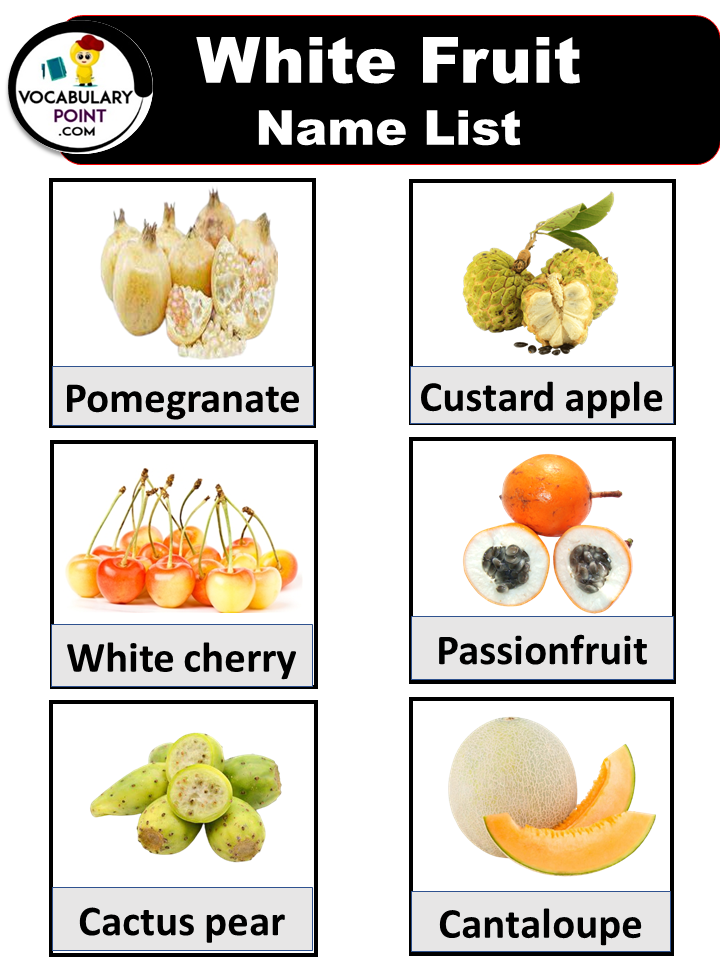
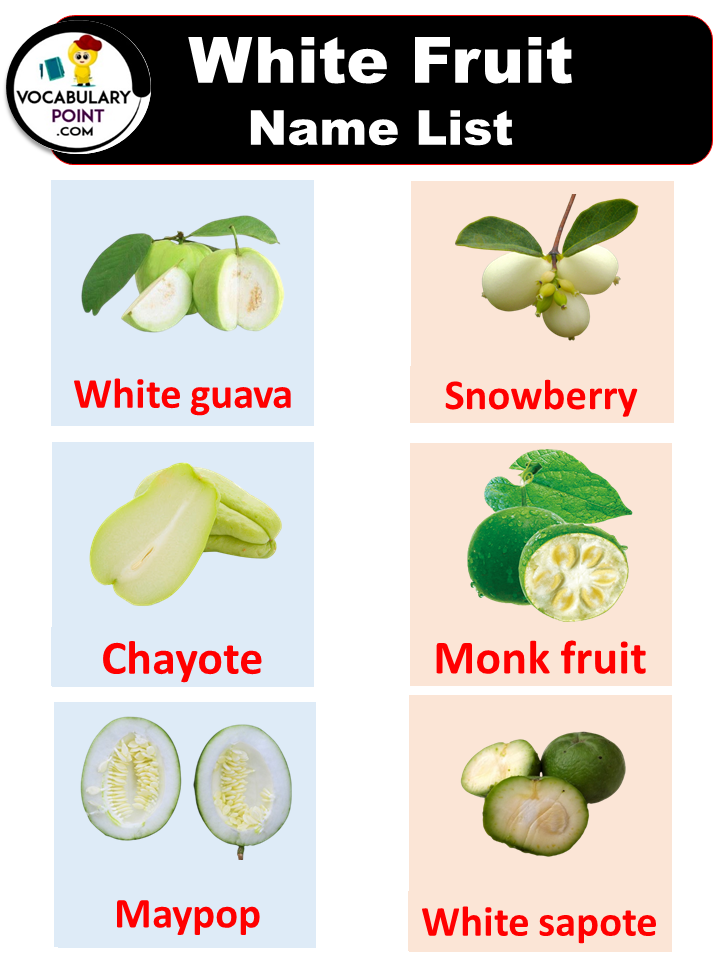
White Fruit Name List
White guava
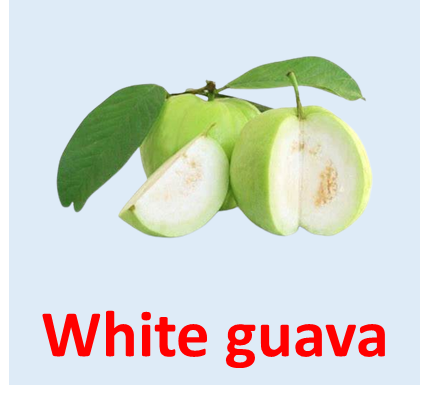
- Nutrient-Rich: White guava offers a plethora of essential nutrients, including vitamin C, vitamin A, dietary fiber, and potassium. These nutrients collectively contribute to boosting the immune system, improving vision health, aiding digestion, and maintaining optimal heart function.
- Antioxidant Powerhouse: White guava is packed with antioxidants such as flavonoids, carotenoids, and polyphenols. These compounds help combat oxidative stress in the body, reducing the risk of chronic diseases, supporting skin health, and promoting overall well-being.
- Low-Calorie Snack: White guava is a delicious and low-calorie option for snacking. Its natural sweetness satisfies cravings without significantly impacting calorie intake, making it an excellent choice for those looking to manage their weight while enjoying a tasty treat.Top of FormBottom of Form
Snowberry
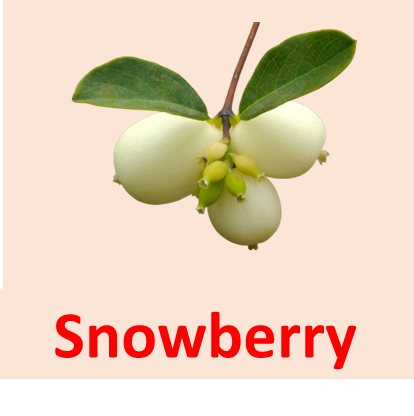
- Immunomodulatory Properties: Snowberry possesses immunomodulatory compounds that help regulate the immune system’s response. This can enhance the body’s ability to defend against infections and diseases while maintaining immune balance.
- Skin Health Support: Snowberry extracts are known for their skin-beneficial properties. They can promote collagen production, improve skin elasticity, and offer anti-inflammatory effects, contributing to a healthier and more youthful complexion.
- Erosion Control: Snowberry plants play a vital role in preventing soil erosion due to their dense and extensive root systems. When planted strategically, they help stabilize soil, prevent runoff, and protect ecosystems from degradation caused by erosion.
Chayote
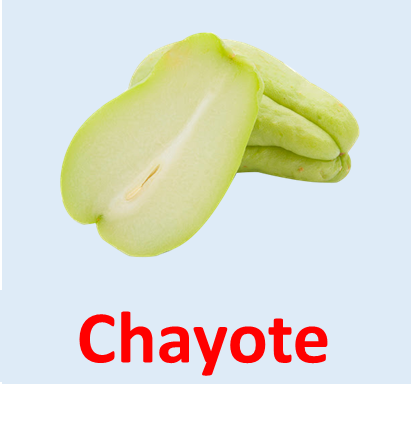
- Dietary Versatility: Chayote is incredibly versatile in cooking and can be prepared in various ways, including grilling, sautéing, and boiling. Its mild flavor and crisp texture make it a delightful addition to salads, stir-fries, and casseroles.
- Digestive Aid: Rich in dietary fiber, chayote supports healthy digestion by promoting regular bowel movements and preventing constipation. The fiber content also helps maintain gut health and can contribute to a feeling of fullness, aiding in weight management.
- Vitamin-Rich: Chayote is a good source of essential vitamins, particularly vitamin C and vitamin B6. These vitamins play crucial roles in boosting the immune system, promoting skin health, aiding in metabolism, and supporting overall well-being.
Monk fruit
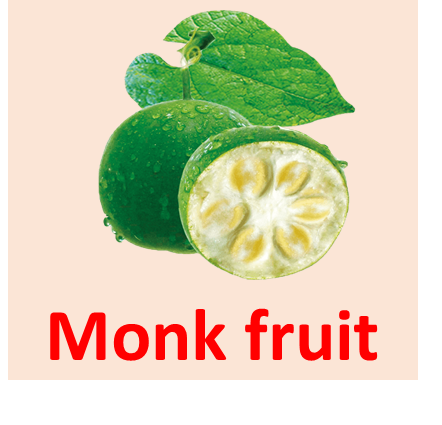
- Natural Sweetener: Monk fruit is widely used as a natural sweetener due to its sweetness without adding calories or carbohydrates. It’s a great alternative for individuals seeking to reduce their sugar intake while still enjoying sweet flavors.
- Antioxidant Properties: Monk fruit contains antioxidants, such as mogrosides, that help combat oxidative stress in the body. These antioxidants contribute to overall health by reducing the risk of chronic diseases and supporting cellular well-being.
- Glycemic Control: Monk fruit’s low glycemic index makes it suitable for people with diabetes or those looking to manage blood sugar levels. Unlike sugar, monk fruit sweeteners do not cause rapid spikes in blood sugar, providing a suitable option for maintaining stable glucose levels.
Maypop
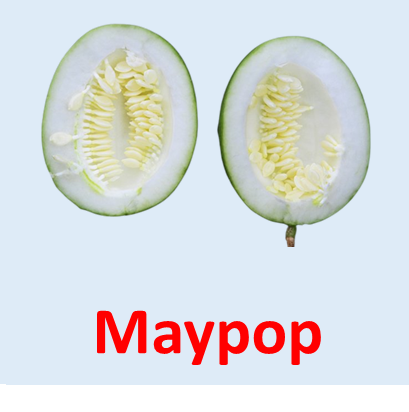
- Medicinal Uses: Maypop, also known as passionflower, has a history of use in traditional medicine. It’s believed to have calming and anxiety-reducing effects, making it useful for managing stress and promoting relaxation.
- Rich in Antioxidants: Maypop is a good source of antioxidants, including flavonoids and phenolic compounds. These antioxidants help protect cells from damage caused by free radicals, contributing to overall health and potentially reducing the risk of chronic diseases.
- Digestive Support: Maypop is sometimes used to support digestive health. It may help alleviate symptoms like indigestion and bloating, and its mild laxative properties can assist in maintaining regular bowel movementsTop of Form.
White sapote
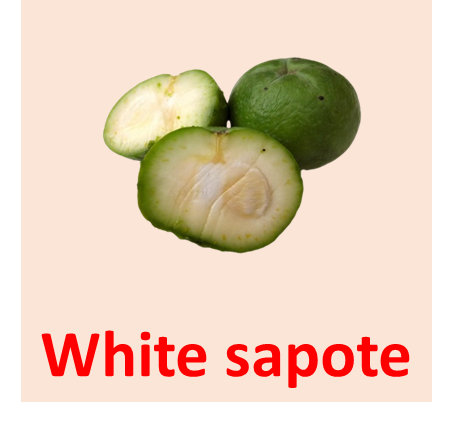
- Dietary Diversity: White sapote adds diversity to the diet with its unique flavor and texture. Incorporating this fruit introduces new taste experiences and encourages a varied and balanced approach to nutrition.
- Vitamin Content: White sapote is a source of essential vitamins, particularly vitamin C and vitamin A. These vitamins contribute to immune system function, vision health, and overall well-being.
- Mineral Support: White sapote contains minerals like potassium and magnesium. These minerals play vital roles in maintaining proper heart function, muscle contraction, and electrolyte balance in the body.Bottom of Form
Pomegranate
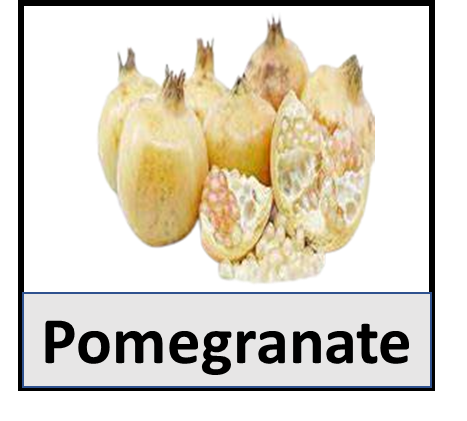
- Antioxidant-Rich: Pomegranates are abundant in antioxidants, which help combat oxidative stress, reduce inflammation, and support overall cellular health.
- Cardiovascular Support: Regular consumption of pomegranate has been linked to improved heart health by promoting healthy blood pressure, reducing cholesterol levels, and enhancing blood vessel function.
- Immune Boosting: Packed with vitamins and minerals such as vitamin C and potassium, pomegranates can contribute to a strengthened immune system, aiding the body’s defense against infections and illnesses.Top of Form
Custard Apple
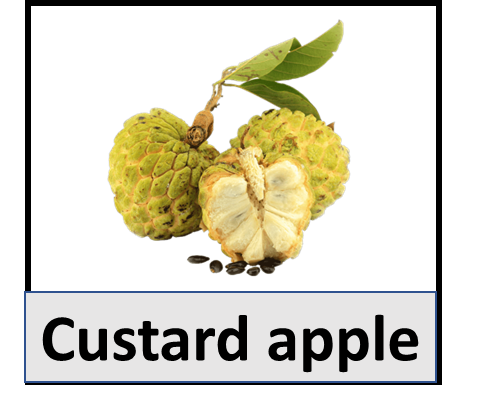
- Rich in Nutrients: Custard apples are a nutritional powerhouse, containing a variety of essential vitamins, minerals, and dietary fiber that contribute to overall health.
- Digestive Aid: The dietary fiber content in custard apples supports healthy digestion by promoting regular bowel movements and preventing constipation.
- Antimicrobial Properties: Custard apples possess natural compounds with potential antimicrobial properties, which can assist in fighting off harmful microorganisms and supporting the body’s immune system.
White cherry
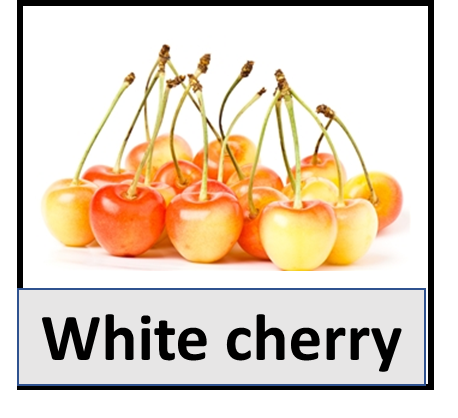
- Abundant in Antioxidants: White cherries are rich in antioxidants, which help protect cells from oxidative damage, promoting overall health and well-being.
- Bone Health: These cherries contain essential nutrients like calcium and vitamin K that contribute to strong and healthy bones.
- Vitamin-Rich: White cherries provide various vitamins, such as vitamin C, that support immune function and skin health.
Passionfruit
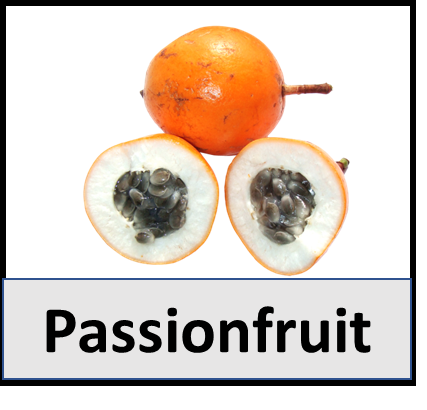
- Dietary Fiber Source: Passionfruit is a good source of dietary fiber, aiding in digestion, promoting regular bowel movements, and supporting gut health.
- Vitamin-Rich: This fruit is packed with essential vitamins like vitamin C, which boosts the immune system and contributes to healthy skin.
- Antioxidant Properties: Passionfruit contains antioxidants that help neutralize harmful free radicals, reducing the risk of chronic diseases and supporting overall well-being.
Cactus pear
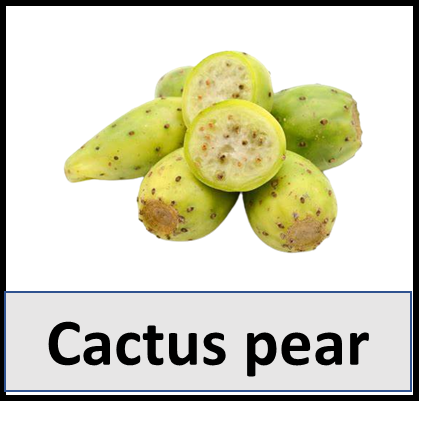
- Dietary Fiber: Cactus pear is rich in dietary fiber, aiding in digestion, maintaining bowel regularity, and supporting a healthy gut.
- Antioxidant Content: This fruit contains antioxidants that help protect cells from damage, contributing to overall health and potentially reducing the risk of certain diseases.
- Blood Sugar Regulation: Cactus pear may assist in regulating blood sugar levels due to its fiber content and potential impact on glucose metabolism, making it beneficial for those managing diabetes or insulin resistance.
Cantaloupe
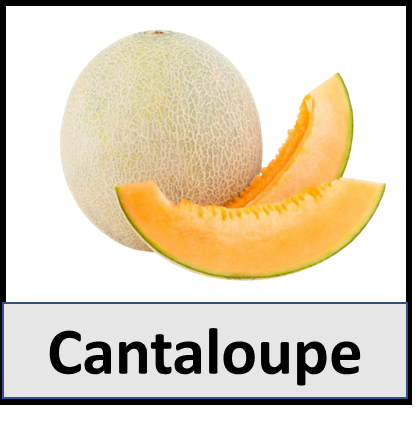
- Hydration Support: Cantaloupe’s high water content can help keep you hydrated, especially in hot weather or during physical activity.
- Vitamin-Rich: This fruit is a great source of vitamins A and C, which are essential for maintaining healthy skin, boosting the immune system, and promoting good vision.
- Digestive Aid: Cantaloupe contains dietary fiber that aids digestion, supports regular bowel movements, and contributes to a healthy digestive system.
